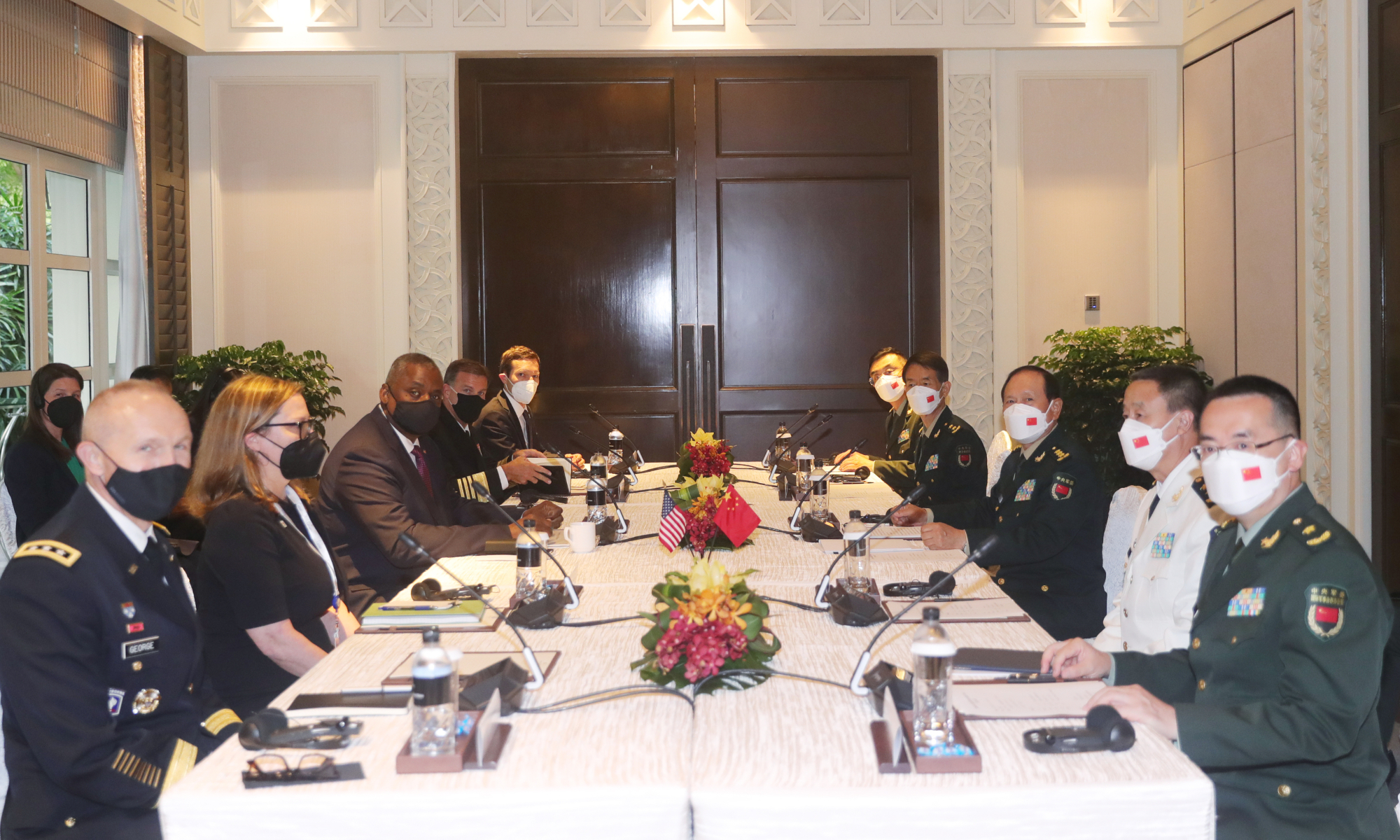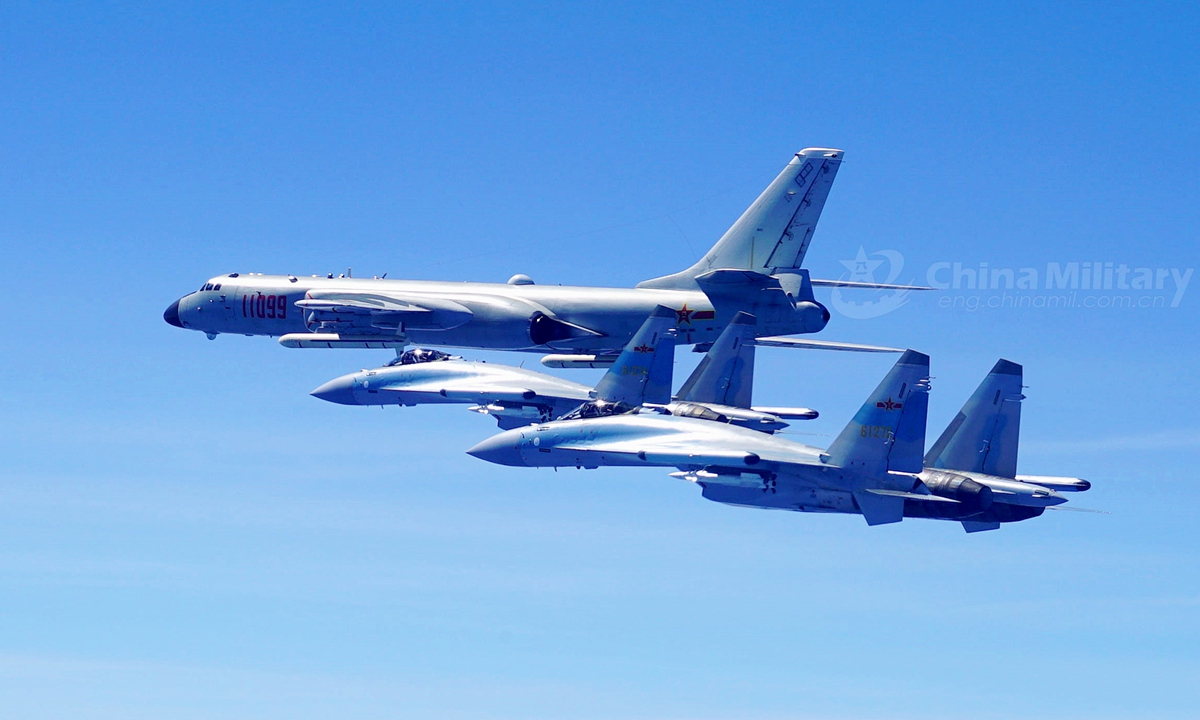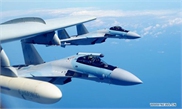China draws security red line to US at defense ministers’ longer-than-expected first meeting

Chinese and US defense chiefs hold their first face-to-face meeting in Singapore on June 10, 2022. Photo: Li Xiaowei
The Chinese military won't hesitate to fight anyone who dares to separate the island of Taiwan from China, China's State Councilor and Defense Minister Wei Fenghe told US Defense Secretary Lloyd Austin during their first meeting in Singapore at the International Institute for Strategic Studies' (IISS) 19th Shangri-La Dialogue on Friday.
With the purpose to use Taiwan island and topics on the South China Sea to hype "China threat," the US seeks to build an iron curtain between China and other Asian countries and to implement its "Indo-Pacific Strategy" by rallying allies, analysts said, noting that China is drawing a bottom line by reiterating its firm stance on the Taiwan question.
After being canceled for two years due to the COVID-19 pandemic, the IISS 19th Shangri-La Dialogue is taking place in Singapore from Friday to Sunday. The talks between Wei and Austin on Friday were the first meeting between Chinese and US defense ministers since Austin took office in January 2021.
Topics on the island of Taiwan, South China Sea, and the Ukraine crisis had been discussed at the defense ministers' meeting.

Two Su-35 fighter jets and a H-6K bomber fly in formation on May 11, 2018. Photo:China Military
There is only one China, and Taiwan is a sacred, inalienable part of China's territory, Wei told Austin, noting that if anyone dares to separate Taiwan from China, the Chinese military will not hesitate to fight, and will resolutely crush any "Taiwan independence" attempts at all cost to firmly safeguard national sovereignty and territorial integrity, senior Colonel Wu Qian, a spokesperson at China's Ministry of National Defense, said at a press conference after the meeting.
Austin reiterated to Wei that the US remains committed to its longstanding one-China policy, which is guided by the Taiwan Relations Act, the Three US-China Joint Communiqués, and the Six Assurances. However, he also "reaffirmed" opposition to "unilateral changes to the status quo," according to a press release from the US Department of Defense.
The Chinese defense minister's remarks stressed China's bottom line for the US as Washington has ramped up efforts to link the Russia-Ukraine conflict with the Taiwan question and create tensions in the region, analysts said. They lashed out at the US for taking "a sausage cutting" strategy to hollow out its one-China policy gradually and intensify the situation at the Taiwan Straits.
Analysts said the US is attempting to shift its EU allies' focus to the Asia-Pacific region and also consolidate its alliance in Asia.
Japan is the one that closely follows the US in using the current Russia-Ukraine crisis to hype the Chinese mainland's "threat" to the island of Taiwan. Japanese Prime Minister Fumio Kishida used the Russia-Ukraine conflict as an example to oppose "unilateral changes" to the status quo by force and unveil a plan to raise Japan's defense budget
The US and its allies have stepped up efforts to promote the implementation of the "Indo-Pacific Strategy" this year, as it is trying to build an iron curtain between China and others in the Asia-Pacific region, Yang Xiyu, a senior research fellow at the China Institute of International Studies, told the Global Times on Friday.
Yang said that the biggest difference in this year's Shangri-La Dialogue is that the Asia-Pacific region is now facing an unprecedented strategic instability. The conflict between Russia and Ukraine has spilled over to the world. NATO is going global, and Western countries have deliberately added fuel to the fire by linking Ukraine with Taiwan, which are irrelevant.
The US had built QUAD, AUKUS, and the Indo-Pacific Economic Framework, but China decided to confidently face them or integrate into them, Yang said, pointing out that China's choice to send its top defense official this year at this sensitive time shows China's confidence and strategic focus, as well as China's strategic sincerity of pushing the Asia-Pacific to integration and cooperation standing at the crossroads.
Frank exchanges
Wei and Austin's meeting on Friday is of significance to implementing the important consensus between the two countries' top leaders and pushing forward the development of the two countries' military ties, said Senior Colonel Wu, noting the conversation was a frank, positive and constructive strategic communication.
Both sides agreed that the two militaries should carefully implement the key consensus reached by the two countries' top leaders, keep frequent communication and manage risks and crises, Wu noted.
The meeting between Chinese and US defense ministers is an exchange of views at this historic moment, as China pushes the region toward integration and cooperation and away from separation and Cold War, Yang said.
The significance of the meeting is that it proved the two countries' high-level conversation is sustainable. Even if the two sides crossed swords with words, being able to exchange views in a frank manner means both sides are willing to implement the consensus reached by the two countries' top leaders, Yang said.
The conversation between the Chinese and US defense ministers has a positive meaning to the deepening of strategic communication, the exploration in the construction of a "guardrail" for China-US relations, as well as the management of risk, Cao Yanzhong, a research fellow at the Academy of Military Sciences of the Chinese People's Liberation Army (PLA), told the Global Times on Friday.
When it comes to the "guardrail" for China-US relations the US wants to build, China has already drawn three bottom lines the US should not cross during the two countries' meetings in Anchorage and Tianjin. The US should keep its promises, stop making provocations on the Taiwan question, stop expanding and enhancing military alliances and partnerships in its attempt to "shape security environment of China," and stop trade sanctions and technology blockades, and take real actions to stabilize China-US relations and promote peace, Cao said.
However, as the US insists on defining the bilateral relations with major power competition, there are two options for such competition to evolve: it can escalate to conflict, or it can pave the way for cooperation, Zhang Yingli, former professor at the International College of Defense Studies at the PLA's National Defense University, told the Global Times on Friday.
The US military frequently carries out close-in reconnaissance and make provocations on China, and China's frontline troops have garnered rich experience and skills as they deal with them. This means Chinese troops can carry out their duties in safeguarding national sovereignty very professionally and avoid possible accidents that could lead to crises from happening as much as possible, Zhang said.
Analysts noted the US should also immediately stop arms sales to and military cooperation with the island of Taiwan, stop the highly frequent close-in reconnaissance on China as well as stop stirring up regional confrontation and security tensions in the Indo-Pacific region.

